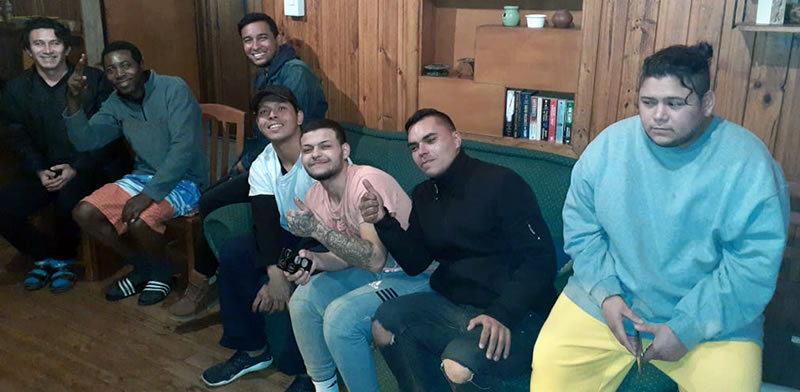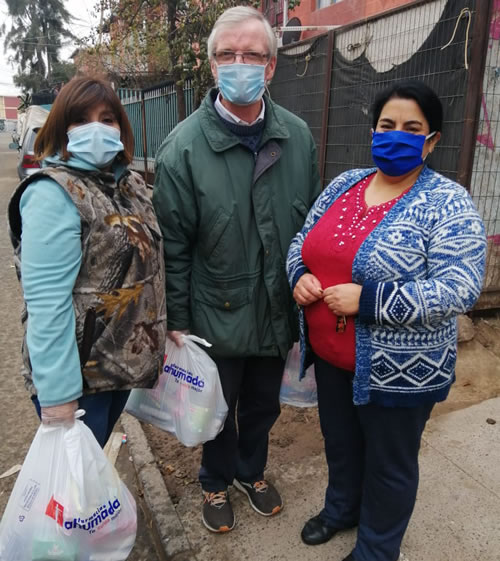
As I write this article, I am safely sheltered in the U.S. Columban headquarters in Bellevue, Nebraska. Since I am approaching the celebration of fifty years as a missionary priest, I decided to leave Chile for a few months and do a sabbatical program at the Oblate School of Theology in San Antonio, Texas. Unfortunately, the program was interrupted because of the coronavirus pandemic. Father John Burger, the Columban Regional Superior in the USA, welcomed me to travel to Nebraska and to wait out the pandemic until I could safely travel back to Chile. Since arriving here, I have tried to follow what is happening in the Columban parishes in Chile and to keep in touch with Columbans and friends in Chile.
Chile is listed as one of ten countries with the highest rates of coronavirus infections. As of June 15, 2020, there were 184.449 reported cases of coronavirus and 3.383 deaths in Chile. The Health Ministry estimates that because of difficulties in processing statistics the number of cases should include 30.000 mores cases. Chile remains in Phase 4 of the outbreak, i.e. uncontrolled and widespread community transmisión. Each day, between 5.000 and 6.000 new cases are reported. Unfortunately, the curve is not flattening in the country. 144.938 men and women who live in the Metropolitan Region of Santiago have been infected. That means about 75% of the cases are concentrated in the central and most populated Metropolitan Región of the country. At present, there is a national curfew from 10.00 P.M until 5.00 A.M. but the municipalities of the Metropolitan Region are under quarantine and it is necessary to obtain a “salvaconducto” (permit) to go out. The salvaconducto authorizes people to leave their homes to perform essential tasks: shop, visit the doctor etc. Several mayors have called for the imposition of a “hibernation” which would make Santiago “una ciudad dormida” (a city asleep).

The Archdiocese of Santiago has responded generously and reached out to alleviate the suffering of the people especially the most vulnerable through a special campaign “Contigo Hermano” (With you brother/sister). The campaign urged the faithful to buy “bonos” (bonds) which cost $1.000 pesos (US $1.25). The collected funds support a series of solidarity initiatives. Every one of the seven territorial vicariates of the Archdiocese were instructed to form a “Consejo Solidario” (Solidarity Council) to coordinate the relief efforts. Parishes set up “ollas comunes” (soup kitchens) and also set up All the retreat houses of the Archdiocese were converted into “albergues” (shelters) for immigrants from Peru, Bolivia and Venezuela. Parishes were encouraged to set up similar shelters for the homeless. Recognizing that the pandemic was causing emotional stress for many people, a telephone hotline, “Estamos Contigo” (“We are with you.) Psychologists and spiritual directors were available to hear people and calm their anxieties. A group of thirty priests was selected to attend the spiritual and sacramental needs of the sick and the deceased and their families.
At present, Columbans are in charge of four parishes in four different municipalities, three in Santiago and one in Iquique. All these municipalities are under the strictest form of quarantine. Residents must stay sheltered in and need a “salvoconducto” which allows them to go out of their homes for two hours to shop, visit the doctor, go to the bank etc. The people of our parishes have been hard hit by the pandemic. They work in open air markets, construction, restaurants etc. Unemployment has left many families without the resources which they need to feed their families. The hardest hit municipality in Chile is Puente Alto on the southern outskirts of the city of Santiago with 10.804 cases as of June 15th. Puente Alto also leads the country as the municipality with most deaths, 183. Columbans have been working in a part of Puente Alto known as Bajos de Mena since 1986. It is one of the most densely populated áreas of the city. Fr. John Greene is a Columban associate priest from the Archdiocese of Dublin a coordinates the solidarity efforts of San Matías parish in Puente Alto. There are nine chapels in the parish. San Matías has been providing “comedores” (soup kitchens) for many years. Now because of the need for social distancing the parish is partnering with neighborhood committees in running three “ollas comunes”. The “olla común” is a system in which volunteers prepare a hot meal for families that come along and take the meals home. For example, the “olla común” in a poor housing área known as Marta Brunet, 150 people are fed every day. Several years ago, the parish set up a shelter for Haitian immigrants. Ordinarily, the immigrants provide their own food but now they depend on the parish. Many other parishioners, especially the sick and the elderly are receiving food parcels.
Before the pandemic the parish of San Columbano in the municipality of El Bosque had developed an impressive program for Haitian and Venezuelan immigrants. Columban Father Dan Harding discovered that within the parish territory there were numerous immigrant families living in precarious conditions and paying exorbitant rents. The pandemic has left many immigrants and their families homeless. When the Dominican Sisters left the parish, their house was renovated and converted into a shelter for immigrants. The shelter is run by a committee formed of parishioners and immigrants. With the help of Columban benefactors, a meeting hall was built to provide language and training courses for immigrants. Together with his associate pastors Fathers Martin Koroiciri and Francisco Jung, Fr. Dan began a program of parish dinners where the various nationalities prepared typical dishes of their countries. As a result, immigrants have integrated well into the life of the parish. An “olla común” is functioning in the chapel of Our Lady of Carmel. Fr. Martin organized a group of volunteers to bring food packages to the families that are under quarantine because members of the family have COVID-19.
Columban Father Vincent Ratnam is the parish priest of Nuestra Señora del Rosario in the municipality of Independencia. In this municipality, there is a heavy concentration of immigrants. The first wave of immigrants came from Perú. Within a few years, the presence of immigrants helped to renovate the parish by becoming catechists and members of the choir. The second wave of immigrants came from Venezuela. Unemployment has left these immigrants without the ability to pay rent and buy food. The Columban Mission Center is collaborating with the parish through monthly donations of food packages. In the municipality of Alto Hospicio, Columban associate priest, Fr. Andrés Lee has worked closely with immigrants in summer vacation colonies in the parish of Sagrado Corazón. In order to observe social distancing the parish had to close its soup kitchen which has operated for many years in a housing área called La Negra. There is a heavy concentration of immigrants in La Negra. An olla común began to function and the parish plans to cooperate.
Fortunately, Columban parishes have been able to respond rapidly because the generosity of our benefactos had helped us to put in place programs of solidarity long before the present crisis. In the midst of this crisis, Columbans continue to are meet the sacramental needs of their people. Sunday Mass is streamed on Facebook. The sick are visited and anointed. Parish Council meetings can be “zoomed”. Columban priests are known for their closeness to their people whom they visit frequently. For them, the lockdown is the cause of considerable suffering. Like all priests, Columbans pray constantly for their people. Right now they are storming heaven praying that our Merciful Father will alleviate suffering and help scientists to develop a vaccine!


 The Columbans are a society of missionaries, including priests and lay people, who minister to people of various cultures as a way of witnessing to the universal love of God.
The Columbans are a society of missionaries, including priests and lay people, who minister to people of various cultures as a way of witnessing to the universal love of God.